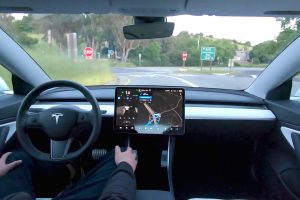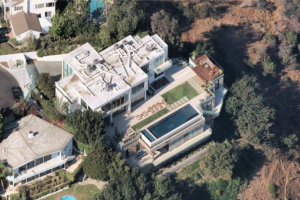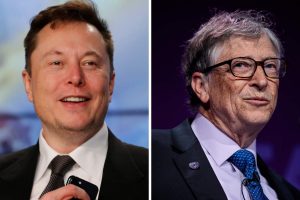Five and a half years have elapsed since Jason Stein of Automotive News last interviewed Tesla CEO, Elon Musk. Plenty has changed since the last Daily Drive podcast with Elon.
Stein stated early in the interview that this was a big week for the company: “You had your first ever streak of four consecutive quarterly profits.”
“Took us awhile,” chuckled Musk. “There were certainly a lot of people who said that would never happen…The Tesla team worked incredibly hard,” he continued. “It’s such an honor to work with such great people. And as a consequence of their great efforts, we were able to achieve four consecutive quarters of profit.”
Stein immediately followed-up, adding that now, “some people are lauding you as a legitimate player on the global scene”–to which the EV maker CEO exploded in laughter: “Finally!–Yes!–I’m legit!”
Of course, it wasn’t all fun and games — they also talked shop: “You’re now producing vehicles on a regular basis,” Stein began. “Let’s just go back the last two years, where you said you were mired in production hell, and now you’re saying–even just this past week–that you think the long-term sustainable advantage of Tesla is going to be manufacturing. What was the biggest thing that changed (with improving manufacturing)?”
Musk replied, stating that he thinks Tesla would have the advantage here because manufacturing on a scale — and efficiently — is the hardest problem automakers have to solve. And the CEO elaborated on why solving this issue would eventually be so crucial: “There’s 2 billion cars and trucks on the road, in the fleet, and there’s 100 million made per year, roughly… even if all cars tomorrow were autonomous, it would take 20 years to replace the fleet. So, if you assume other companies will figure out autonomy, or somebody will provide them with that solution… we’ll just have to be better at manufacturing than them.”
It’s clear that Tesla is constantly looking at ways to improve the performance of the plant. Unsurprisingly, as SpaceX’s CEO, Musk is looking through a physics-first lens into this issue. He asks the question: “At the limit, how good could manufacturing be, if you fully optimized the velocity and density of the factory?…You can think of the factory like a CPU or a microchip. You bring the circuits closer together, you increase the clock speed, and then you can calculate some theoretical limits for the output of a given silicon fabrication technology. I think the same is true of factories.”
Musk explained that your average automotive factory today is essentially very slow — pushing cars out at about a fifth of walking speed. Remarkably, with the right emphasis, Musk claims that “it is possible to increase automotive efficiency by at least 1,000%, and possibly 10,000%.”
Recognizing this statement’s significance, Stein “shifted gears” to investigate Tesla’s overall market dominance on legacy OEMs. Musk’s response was clear and powerful: “We make products we love, all the way down to the little details.” From fun Easter eggs to games, from autonomous / driver assistance to an excellent phone app, and an ultra-easy buying / delivery experience — Tesla puts their heart into making cars and apps that customers would enjoy.
In particular, given the larger context of COVID-19, Stein recognized Tesla’s leadership in contactless deliveries — within their broader first-retail digital model, and that “many dealers are changing to that model.”
“Yeah, I mean, we still saw strong orders through the entire pandemic,” the CEO replied. “We still had good order volume… because I guess people are less inclined to want to go to a dealership, do test drives, hang out in the lobby, and that kind of thing.” A clear digital model, with easy ordering and seamless delivery, is what customers seek.
And what other people want, on their electric vehicle, is good range too. Musk shared his perspective on what might be “good”: “I do think expectations for range are growing over time. The goal posts are moving. Where 250 miles is currently an acceptable standard for range…Long term I think 300 miles will be kind of what people expect as normal for an electric car.. And for the Model S, we’re already over 400 miles.”
Reflecting back on their 2015 conversation in Detroit, where Musk spoke about the value of legacy auto supporting EV growth, Stein asked how much Musk has been encouraged since then. Although Musk admitted to feeling shocked at the slower speed, he is still pleased to see automakers increasingly committing to EVs: “I think we have reached some sort of inflection point in automotive, where I think most car companies have made it clear they are going to make a lot of EVs, and some of them have said they see the future as being only EV. I think there are still a few on the fence about hydrogen fuel cell BS but, they’ll get off that fence or the market will teach them a lesson. So, yeah.”
While Stein acknowledged that in the coming years there are hundreds of EVs scheduled for production, he was less than convinced of the existence of non-Tesla demand: “I think there is tepid demand outside of Tesla, would be my analysis.” Stein Later added that “maybe that points back to not having cars that are as interesting.”
Musk acknowledged that he didn’t concentrate much of his attention on the competition, but he took a stab at it: “Yeah, I think maybe the range is not good enough, they’re too expensive, or don’t have good autonomy. I don’t really know because I haven’t tried ’em [other EVs]. What do you think they should do?”
Stein reply: “Make attractive, interesting vehicles.”
For years now, Tesla has been doing exactly that, and the product diagram that lies ahead is only ever more thought-provoking. Meanwhile, as Musk pointed out, Tesla’s rivals currently have a $7,500 tax credit advantage per vehicle — and yet we see that they contain mediocre market share.
In order for Tesla to be a successful catalyst for the world’s sustainable energy transition, legacy OEMs will need to step up, or probably learn a hard lesson. Refocusing away from fossil fuels and then ramping up EV and the advancement of autonomy will not only prove the right thing to do, but will also be necessary to retain future relevance. So, as Musk says, roll up your sleeves, step past spreadsheets and PowerPoint. Start making cars that are exiting that will make a positive impact to our planet.
Part two and three of Jason Stein ‘s interview with Elon Musk on Monday and Tuesday, August 3 and 4, 2020 airing on “The Daily Drive.”
Click here for the full interview.
Want to buy a Tesla Model 3, Model Y, Model S, or Model X? Feel free to use my referral code to get some free Supercharging miles with your purchase: http://ts.la/guanyu3423
You can also get a $100 discount on Tesla Solar with that code. No pressure.





